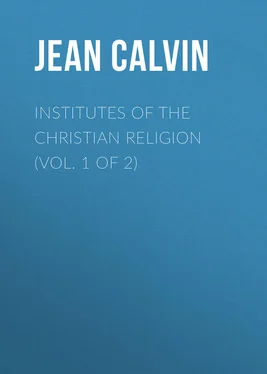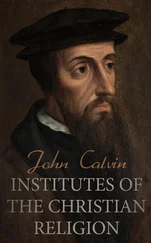Jean Calvin - Institutes of the Christian Religion (Vol. 1 of 2)
Здесь есть возможность читать онлайн «Jean Calvin - Institutes of the Christian Religion (Vol. 1 of 2)» — ознакомительный отрывок электронной книги совершенно бесплатно, а после прочтения отрывка купить полную версию. В некоторых случаях можно слушать аудио, скачать через торрент в формате fb2 и присутствует краткое содержание. Жанр: foreign_antique, foreign_prose, на английском языке. Описание произведения, (предисловие) а так же отзывы посетителей доступны на портале библиотеки ЛибКат.
- Название:Institutes of the Christian Religion (Vol. 1 of 2)
- Автор:
- Жанр:
- Год:неизвестен
- ISBN:нет данных
- Рейтинг книги:3 / 5. Голосов: 1
-
Избранное:Добавить в избранное
- Отзывы:
-
Ваша оценка:
- 60
- 1
- 2
- 3
- 4
- 5
Institutes of the Christian Religion (Vol. 1 of 2): краткое содержание, описание и аннотация
Предлагаем к чтению аннотацию, описание, краткое содержание или предисловие (зависит от того, что написал сам автор книги «Institutes of the Christian Religion (Vol. 1 of 2)»). Если вы не нашли необходимую информацию о книге — напишите в комментариях, мы постараемся отыскать её.
Institutes of the Christian Religion (Vol. 1 of 2) — читать онлайн ознакомительный отрывок
Ниже представлен текст книги, разбитый по страницам. Система сохранения места последней прочитанной страницы, позволяет с удобством читать онлайн бесплатно книгу «Institutes of the Christian Religion (Vol. 1 of 2)», без необходимости каждый раз заново искать на чём Вы остановились. Поставьте закладку, и сможете в любой момент перейти на страницу, на которой закончили чтение.
Интервал:
Закладка:
But perhaps, of all the writings of Calvin, none has excited so much attention as his Institutes of the Christian Religion.
His original design in commencing this work is stated by himself, in the beginning of his dedication, to have been to supply his countrymen, the French, with an elementary compendium for their instruction in the principles of true religion. But we learn from Beza that, by the time of its completion, existing circumstances furnished the Author with an additional motive for sending it into the world, during his residence at Basil, whither he had retired to avoid the persecution which was then raging in France against all the dissentients from the Church of Rome. Francis the First, king of France, courted the friendship of the Protestant princes of Germany; and knowing their detestation of the cruelties which he employed against his subjects of the reformed religion, he endeavoured to excuse his conduct by alleging that he caused none to be put to death except some few fanatics; who, so far from taking the word of God as the rule of their faith, gave themselves up to the impulses of their disordered imaginations, and even openly avowed a contempt of magistrates and sovereign princes. Unable to bear such foul aspersions of his brethren, Calvin determined on the immediate publication of this treatise, which he thought would serve as an answer to the calumnies circulated by the enemies of the truth, and as an apology for his pious and persecuted countrymen.
The Dedication to Francis is one of the most masterly compositions of modern times. The purity, elegance, and energy of style; the bold, yet respectful, freedom of address; the firm attachment to the Divine word; the Christian fortitude in the midst of persecution; the triumphant refutation of the calumnies of detractors; with other qualities which distinguish this celebrated remonstrance, will surely permit no reader of taste or piety to withhold his concurrence from the general admiration which it has received.
The Author composed this treatise in Latin and French, and though, at its first appearance, it was little more than an outline of what it afterwards became, it was received with uncommon approbation, and a second edition of it was soon required. How many editions it passed through during his life, it is difficult, if not impossible, now to ascertain; but it obtained a very extensive circulation, and was reprinted several times, and every time was further improved and enlarged by him, till, in the year 1559, twenty-three years after the first impression, he put the finishing hand to his work, and published it in Latin and French, with his last corrections and additions.
The circulation which it enjoyed was not confined to persons capable of reading it in the languages in which it was written. It was translated into High Dutch, Low Dutch, Italian, and Spanish.
Soon after the publication of the Author's last edition, it was translated from the Latin into English. In this language it appears to have reached six editions in the life of the Translator. A reflection on the small number of persons who may be supposed to have had inclination and ability to read such a book at that period, compared with the number of readers in the present age, may excite some wonder that there should have been a demand for so many editions. But no surprise at this circumstance will be felt by any person acquainted with the high estimation in which the works of the Author were held by the venerable Reformers of the Church of England, and their immediate successors, as well as by the great majority of religious people in this country. This is not a question of opinion, but an undeniable fact. Dr. Heylin, the admirer and biographer of Archbishop Laud, speaking of the early part of the seventeenth century, says, that Calvin's “Book of Institutes was, for the most part, the foundation on which the young divines of those times did build their studies.” The great Dr. Saunderson, who was chaplain to King Charles I., and, after the restoration of Charles II., was created Bishop of Lincoln, says, “When I began to set myself to the study of divinity as my proper business, Calvin's Institutions were recommended to me, as they were generally to all young scholars in those times, as the best and perfectest system of divinity, and the fittest to be laid as a ground-work in the study of this profession. And, indeed, my expectation was not at all deceived in the reading of those Institutions.” 1 1 It is not uncommon, among persons of a certain class, to represent the leading principles of Calvin as unfavourable to practical religion, and to that kind of preaching which is adapted to affect the hearts and consciences of the hearers. A reference to the most able and intelligent theologians and preachers who have held those principles, and upon whom they may reasonably be concluded to have exerted their genuine and fullest influence, will amply evince the inaccuracy of this representation. Of the excellent divine quoted above, King Charles I. was wont to say, that “he carried his ears to hear other preachers, but his conscience to hear Mr. Saunderson.”
The great changes which have taken place in our language render it difficult to form a correct opinion of the merits of Mr. Norton's translation, which was first published about two hundred and fifty years ago. It must give rather a favourable idea of its execution, that it was carefully revised by the Rev. David Whitehead, a man of learning and piety, who, in the reign of Henry VIII., was nominated by Archbishop Cranmer to a bishopric in Ireland, and, soon after the accession of Queen Elizabeth, was solicited by that Princess to fill the metropolitan see of Canterbury, but declined the preferment. But, whatever were the merits or defects of that translation at its first appearance, it has long been too antiquated, uncouth, and obscure, to convey any just idea of the original work, and abounds with passages which, to the modern English reader, cannot but be altogether unintelligible.
The intrinsic excellence of the book, its importance in the history of theological controversy, the celebrity of the Author, the application of his name to designate the leading principles of the system he maintained, and the frequent collision of sentiment respecting various parts of that system, combine with other considerations to render it a matter of wonder, that it has not long ago been given to the English public in a new dress. The importance of it has also been much increased by the recent controversy respecting Calvinism, commenced by Dr. Tomline, the present Bishop of Lincoln, in which such direct and copious reference has been made to the writings of this Reformer, and especially to his Christian Institutes. These circumstances and considerations have led to the present translation and publication, which, from the very respectable encouragement it has received, the Translator trusts will be regarded as an acceptable service to the religious public.
Among the different methods of translation which have been recommended, he has adopted that which appeared to him best fitted to the present undertaking. A servile adherence to the letter of the original, the style of which is so very remote from the English idiom, he thought would convey a very inadequate representation of the work; such extreme fidelity, to use an expression of Cowper's, being seldom successful, even in a faithful transmission of the precise sentiments of the author to the mind of the reader. A mere attention to the ideas and sentiments of the original, to the neglect of its style and manner, would expose the Translator of a treatise of this nature to no small danger of misrepresenting the meaning of the Author, by too frequent and unnecessary deviations from his language. He has, therefore, aimed at a medium between servility and looseness, and endeavoured to follow the style of the original as far as the respective idioms of the Latin and English would admit.
Читать дальшеИнтервал:
Закладка:
Похожие книги на «Institutes of the Christian Religion (Vol. 1 of 2)»
Представляем Вашему вниманию похожие книги на «Institutes of the Christian Religion (Vol. 1 of 2)» списком для выбора. Мы отобрали схожую по названию и смыслу литературу в надежде предоставить читателям больше вариантов отыскать новые, интересные, ещё непрочитанные произведения.
Обсуждение, отзывы о книге «Institutes of the Christian Religion (Vol. 1 of 2)» и просто собственные мнения читателей. Оставьте ваши комментарии, напишите, что Вы думаете о произведении, его смысле или главных героях. Укажите что конкретно понравилось, а что нет, и почему Вы так считаете.












